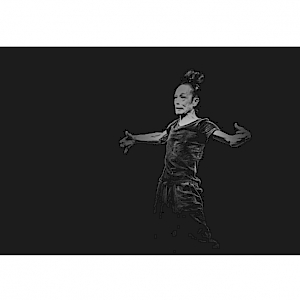Kasai Akira Post Butoh Performance“Unfinished”

Congratulations, one and all, on your admission to the university.
It is always this way; society seemingly engulfed in a vortex of chaos. But you are a light.Keep shining and walk on.
These pieces are significant to me, personally. Schubert's “Unfinished” was the last work I danced to in Daiichi Seimei Hall 45 years ago when I had decided to emigrate from Japan to what was then West Germany.
The Concierto de Aranjuez was a piece that my teacher, Kazuo Ohno, choreographed for my debut recital. Winterreise is the theme song of my journey.
Akira Kasai
★Flyer: Download
Date
Wednesday 15 May 2024, 18:00 start (Doors open at 17:00)
Venue
Keio University Hiyoshi Campus, Raiosha Event Terrace
Audience
Open to anyone
Cost
Admission Free
Enquiries and bookings
Keio University Art Center
2-15-45 Mita, Minato-ku, Tokyo, 108-8345
Tel 03-5427-1621
pj.ca.oiek.c-tra@otomihsi
Performance[Keio University Freshman Event 2024]
Date
Wednesday 15 May 2024, 18:00 start (Doors open at 17:00)
Venue
Keio University Hiyoshi Campus, Raiosha
4-1-1 Hiyoshi, Kohoku-ku,Yokohama
Access from Hiyoshi Station(Tokyu Toyoko Line / Tokyu Meguro Line / Tokyu Shin-yokohama Line / Yokohama Municipal Subway Green Line)
Audience
Open to anyone
Cost
Admission Free
Booking
No booking required
Lecturer/Performer
[Performer]
Akira Kasai
[Sound/Lighting]
Masaru Soga
[Music Pieces]
First and second movements from Franz Schubert's Symphony No. 8 in B Minor, “Unfinished”
Second movement from Joaquin Rodrigo's Concierto de Aranjuez for guitar and orchestra
“Der Leiermann” and other selections from Franz Schubert’s Winterreise
[Performer profile]
Kasai Akira was born in Mie Prefecture in 1943. His childhood was marked by the strict discipline of his father Torao, a judge, who he lost to the Toya Maru ferry accident on September 26, 1954. Although he has never been baptized, he has extensive experience with the Christian lifestyle, and it would be safe to characterize the historical “Resurrection of Jesus” as one of Kasai’s lifelong themes. He entered the world of dance following his studies at the studio of Eguchi Takaya and Miya Misako, and would go on to meet Ohno Kazuo and study directly under him for three years. In October 1963 he encountered Hijikata Tatsumi as a dancer in the Gi-gi (“Sacrifice Ceremony“) at Asahi Hall and would later perform in “A Rose-colored Dance: A LA MAISON DE M. CIVECAWA” at Sennichidani Hall, in November 1965. He established his own studio, the Tenshi-kan (“House of Angels”), in 1971, and lived in Germany from 1979 to 1985. His practice takes in eurhythmy and pantomime, and is not constrained by “butoh” in its narrow sense.
A highly regarded writer, his position of emphasizing mystery and spirituality is expounded in his books Tenshi-ron (“About Angel”), Seirei Butoh (“Spiritual Butoh”), and Tomei Meikyuu (“Crystal Labyrinth”) – a photographic collection produced in collaboration with Eikoh Hosoe – among many other published works. His works cover a broad range of topics from Western occultism through to Oishigori Masumi’s Shinkun Kojiki (“Chronicles of Shinkun”), and sublimates them into “dances” which transcend mere quotidian language, earning him an ardent fan base as an author. Meanwhile, just as he puts it that: “I can hear the music of the heavens” (Spiritual Butoh, p.9), and asserts that “The Holy Spirit is energy, and one cannot live for a single moment without it” (Spiritual Butoh, p.26.), as a dancer he gives his audiences a sense of the cosmic as well as of tradition, transcending Modern Japan through a pre-modern, European, “Dance Cosmology.” He is, in essence, embodying the irresoluble mysteries of the gods found, for example, in the poetry of Sir John Davies, 1569-1626.
As Kasai states at the beginning of The Body and Life: Super Generational Dance: “As long as history is a living entity in the continual process of change, any era is a turning point. Nevertheless, rather than each person living continually across all eras, humans are confined to specific time periods, with their own sense of how the era in which they actually live constitutes a turning point. Such perception will involve marshaling their imaginations to achieve a bird’s eye view of history as a whole.” Such sentiments illustrate Kasai’s strong awareness that modernity and the social are also pivotal to dance. A recipient of the Minister of Education Award for Fine Arts for his 2013 performance “Dancing the Constitution of Japan.”
This is the fifth occasion on which Akira Kasai will perform at the welcome event for Keio University’s incoming students. In 2010, he conducted the poetry and dance session, “Sphere, Flashing Souls: REQUIEM” in a collaboration with Gozo Yoshimasu. He later performed “Dancing the Constitution of Japan” in 2020, “Dancing John the Apostle” in 2021, and “Dancing Chopin” in 2022. (Hayato Kosuge)
Enquiries and bookings
Keio University Art Center
2-15-45 Mita, Minato-ku, Tokyo, 108-8345
Tel 03-5427-1621
pj.ca.oiek.c-tra@otomihsi
Organiser(s)
Hosts: Hiyoshi Art and Performance Project (HAPP), Keio University Art Center (KUAC)
Cooperation: Keio Senior High School, Portfolio Butoh
Coordinator: Hayato Kosuge